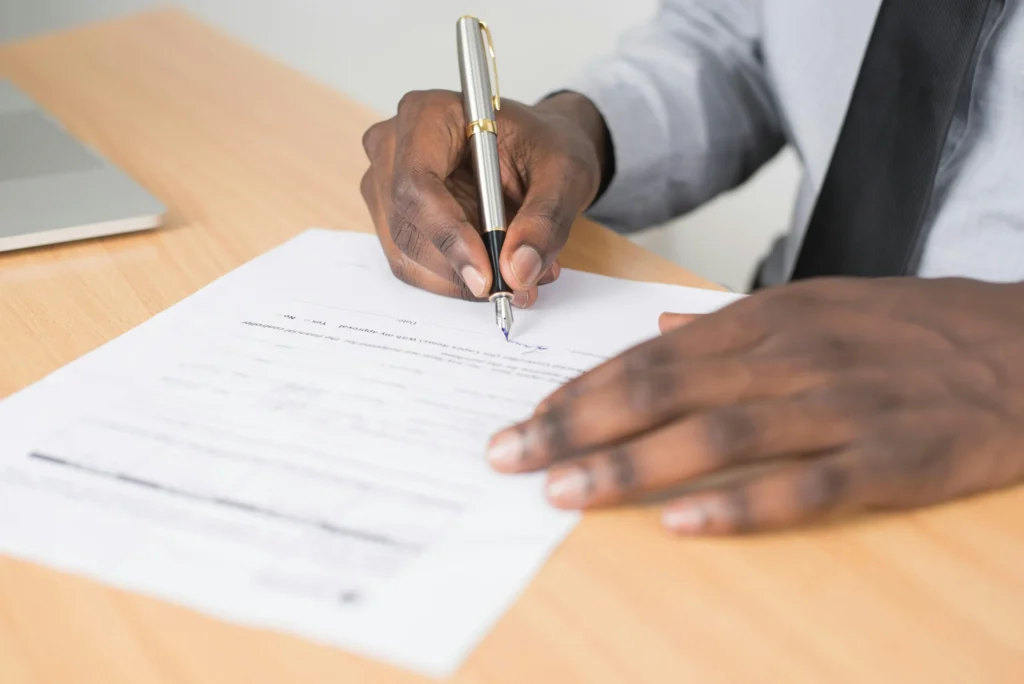When it comes to buying, selling, or renting a property in Colombia, one key figure almost always appears: the real estate brokerage contract.
This agreement regulates the relationship between the property owner or buyer and a natural or legal person—known as a broker, agent, or real estate company—responsible for connecting the parties, promoting the property for sale, and facilitating the business conditions.
In addition, within this relationship, the broker usually verifies the property’s legal documentation, including ownership, registry history, and other legal aspects, to provide security to the parties and ensure that the transaction is carried out on solid and reliable grounds.
In other words, when an owner wants to sell an apartment or a tenant wants to rent a home, the brokerage contract becomes the ideal legal tool to formalize the intermediation. Through this agreement, the conditions of the management are clearly established: the broker’s obligations, the scope of their work, and especially the form, amount, and party responsible for paying the commission.
Its importance lies in the fact that it protects both the property owner and the person interested in buying or renting, as it clearly and precisely establishes the terms of the intermediation.
This way, misunderstandings about the value and method of payment of the commission, the broker’s obligations, and the scope of their work are avoided—guaranteeing transparency, legal security, and confidence throughout the entire negotiation process.
What Is a Real Estate Brokerage Contract?
The real estate brokerage contract is regulated by the Colombian Commercial Code (Articles 1340 to 1353).
It consists of entrusting a third party—called a broker or agent—with the task of bringing together two people interested in carrying out a real estate transaction.
👉 Practical example: if you want to sell your house, you hire a broker to find a buyer. Their role is to “present” both parties, without creating any labor, representation, or mandate relationship between the broker and the contracting parties.
Is a “Broker Agreement” the Same as a Real Estate Brokerage Contract in Colombia?
If you are familiar with the U.S. or European real estate market, you might wonder whether the Colombian contrato de corretaje inmobiliario is the same as a broker agreement.
The answer: they are similar, but not identical.
Aspect | Broker Agreement (U.S./Europe) | Brokerage Contract (Colombia) |
Main purpose | Representation of the seller or buyer, usually with exclusivity. | Pure intermediation: the broker only connects the parties. |
Legal framework | Real estate laws, often requires licensed brokers. | Colombian Commercial Code (Arts. 1340–1353). No licensing requirement. |
Representation | Broker can act on behalf of the client (e.g., sign certain documents). | Broker does not represent either party; only introduces them. |
Commission | Typically paid by seller, negotiated in advance. | Commonly paid by seller, but can be shared or assigned differently. |
Exclusivity | Common—seller or buyer commits to work only with that broker. | Not required—several brokers may present buyers; only the one who closes earns commission. |
👉 In short:
- A broker agreement in English-speaking countries usually means representation plus exclusivity.
- A brokerage contract in Colombia means intermediation without representation.
For foreigners, this distinction is crucial. In Colombia, the broker cannot legally bind you or act in your name—their role is limited to connecting you with the other party.
Does the Contract Need to Be Written or Can It Be Verbal?
The law allows it to be either verbal or written, but in practice, it is always advisable to put it in writing.
This avoids later disputes over whether intermediation actually occurred, how much commission should be paid, and who was responsible for covering it.
A written contract may include:
- The exact commission percentage
- Who pays the commission (buyer, seller, or both)
- Deadline for payment
- Additional services (such as paperwork, notary assistance, or document management)
How Is the Brokerage Commission Paid?
The broker receives a commission based on the value of the transaction (sale or rental).
If the parties do not agree on a percentage, Article 1341 of the Commercial Code states that the “usual” market commission will apply, or, failing that, the one determined by experts.
📌 Key point:
The right to commission only arises if the transaction is successfully completed thanks to the broker’s intermediation.
If the deal never closes, the broker cannot claim payment for the time spent.
Who Pays the Commission?
As a general rule, the commission is split equally between buyer and seller, unless otherwise agreed. In practice, it usually falls on the seller. However, it may also be fully assumed by the party that initially contacted the broker, or redistributed according to what is expressly agreed in the contract.
⚠️ Frequent risk: some brokers charge commission to both parties without prior agreement. To avoid these situations, the brokerage contract must clearly state the percentage each party is responsible for, along with the conditions and method of payment.
Broker’s Duties and Limits
The broker is not required to guarantee that the transaction will close, nor to perform additional tasks. Their main function is simply to connect the parties.
However, in the real estate sector, it is common for brokers to also assist with:
- Requesting certificates and clearances
- Supporting the mortgage loan process
- Preparing documents for the notary
Likewise, brokers have the duty to provide truthful, clear, and sufficient information about the legal and physical condition of the property, as well as the conditions under which the transaction will take place. These additional activities are not part of the broker’s strict legal obligation, but they have become common practices that build trust and provide greater security to the parties involved.
Practical Tips Before Signing a Brokerage Contract
- Always demand a written contract: even though the law allows verbal agreements, paper is your best protection.
- Define the commission percentage: the usual range in sales is 3% to 5%.
- Clarify who pays the commission: buyer, seller, or both.
- Verify the broker’s experience: ask for references or check if they belong to a recognized real estate company.
- Avoid abusive clauses: such as paying commission even if the deal closes without the broker’s involvement.
Frequently Asked Questions (FAQ)
What happens if the deal doesn’t close?
The broker has no right to commission, since it is only paid upon results.
Does the commission have to be paid immediately?
It depends on what was agreed. Normally, it is paid at the closing, when the deed or lease contract is signed.
What if I hire multiple brokers?
All of them may present interested parties, but only the one who proves their efforts led to the deal has the right to commission.
How much is the commission for rentals?
It generally equals one month’s rent, but this may vary depending on the agreement.
The real estate brokerage contract in Colombia is much more than a mere formality: it is the legal tool that ensures property sales, purchases, or rentals are carried out with clear rules, protecting both owners and buyers or tenants.
By putting in writing the commission, who pays it, and the broker’s scope of work, conflicts are avoided, and a transparent process is guaranteed.
👉 At Nexo Legal, we support owners, buyers, and investors in drafting, reviewing, and strengthening brokerage contracts that protect your interests and prevent legal surprises.
📩 Contact us today and get personalized legal advice to close your real estate deal safely and confidently.
Get started with a free case assessment
What will happen after you fill out this form?
After submitting the form, your case undergoes a comprehensive review by our team of specialist to assess its viability. Providing clear and concise information about your objectives accelerates this process.
Subsequently, a specialist will be assigned to your case, reaching out to you within a day to clear up details about your case and outline the next steps to help you achieve your goals.
Get started with a free case assessment
What will happen after you fill out this form?
After submitting the form, your case undergoes a comprehensive review by our team of specialist to assess its viability. Providing clear and concise information about your objectives accelerates this process.
Subsequently, a specialist will be assigned to your case, reaching out to you within a day to clear up details about your case and outline the next steps to help you achieve your goals.


